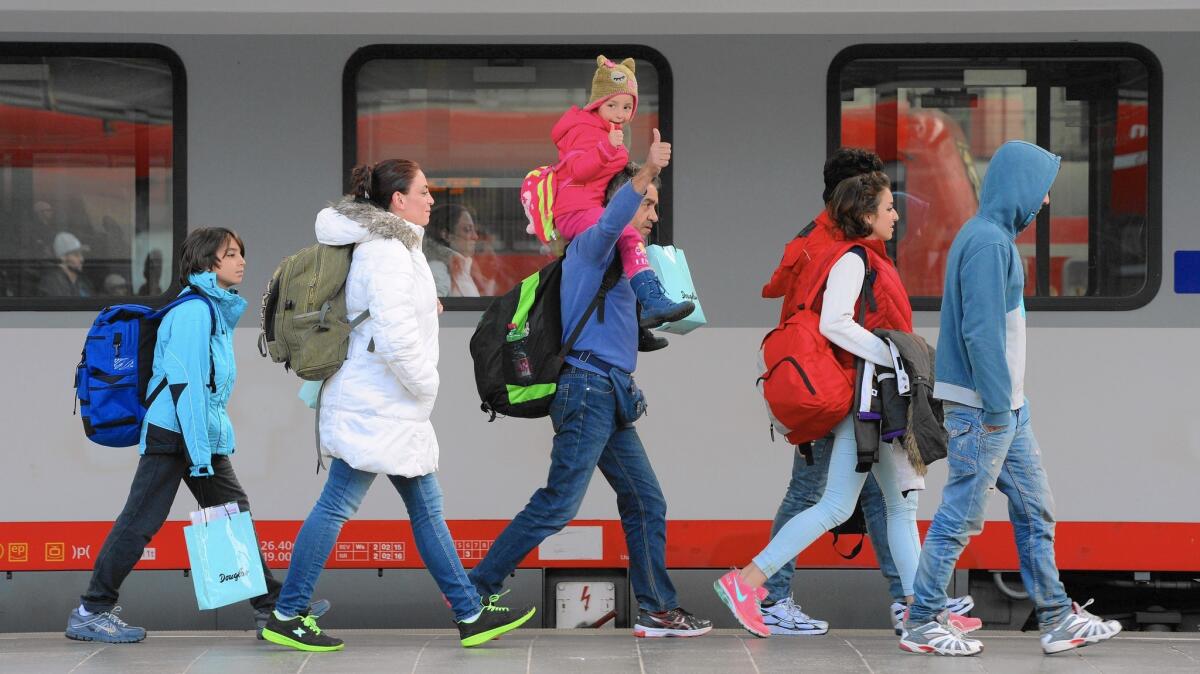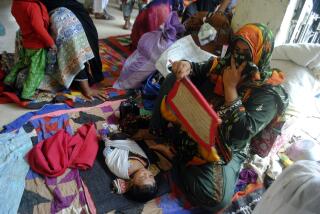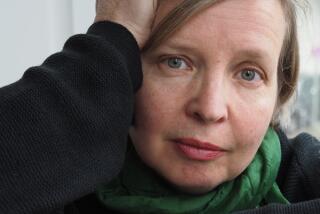Inside the train to Germany: Wonder, fatigue and, for a moment, fear

ABOARD THE TRAIN TO MUNICH, Germany — Nine-year-old Ali peered out the train window at the verdant, unfamiliar landscape. At the sight of misty low clouds wreathing a high hill, his eyes widened.
“Is that a volcano?” he asked, avid. He’d seen pictures of them in books.
On a normal day, the four-hour high-speed rail run between Vienna, the old imperial seat of power, and Munich, the beer-loving metropolis near the foot of the German Alps, would carry a mix of tourists, students and businesspeople. Passengers usually sit quietly with eyes glued to phones and tablets, glancing only occasionally at the tidy towns and orderly roadways spooling past outside.
On this day, though, dozens of migrants — most of them from Syria — gazed out with something like disbelief as the train clicked along at a steady 73 mph, bringing them ever closer to a destination that had become, over weeks of punishing travel, a literal land of dreams.
“Sometimes when we were sleeping in a field, I’d imagine it,” said Mohamed Abras, a 20-year-old student from Damascus, Syria’s capital, who fled to Turkey rather than face conscription into the army. From there, he rode a rubber raft to Greece, bedded down outdoors in Macedonia, fell horribly ill in Serbia and evaded the police in Hungary.
The train was full to overflowing, with every available seat taken and some people standing or sprawled on the floor. Authorities had put extra trains into service to carry some of the thousands who flooded into Austria over the weekend, bound for Germany and other destinations to the north and west, but also provided passage on scheduled commercial service to many others.
In contrast to Western travelers who carried sleek briefcases or rollaway spinner bags they stowed neatly in overhead baggage racks, most of the migrants and asylum seekers clutched single small backpacks, their worldly possessions winnowed down to the bare necessities of life on the road.
Many of the adults sagged in exhaustion. Nisreen Salem, Ali’s widowed mother, said it had been days since she had slept in any way other than nodding off on her own shoulder — gesturing to show fitful, head-jerking sleep. She nearly slipped into another of those naps as she spoke.
With their mother’s vigilance eased, Ali and his 4-year-old sister, Rafet, were playing in the aisles several cars away, with him pretending to be a horse, her riding astride, until he stood up and scraped her off him. A few passengers frowned, but most looked on indulgently.
Asked if it was his first train ride, Ali was indignant, puffing out his chest like a miniature man of the world. “Of course not,” he said. That had been the day before, from near Austria’s border with Hungary.
In the cafe car, a barman serving up espresso and beer helped a Kurdish refugee decipher the menu, then laboriously count out euro coins to pay for his curry. The young waitress, dodging Ali and Rafet as they wrestled between two tables, was asked about the unaccustomed passenger manifest.
“It’s complicated,” she said. “But we’re managing. We’ll have to keep managing.”
As the fairy-tale spires of Salzburg, Mozart’s Austrian hometown, receded outside the train window, Marzan Arab tensed, rocking a bit in his seat. He knew the border was near now.
“Almost Germany,” the 22-year-old student murmured. “Almost Germany.”
In fact, the frontier flashed by unmarked. Migrant passengers checked their cellphones as service shifted to German carriers. “We’re reading road signs,” said Abras, smiling. “German road signs.”
A piercing howl echoed through the carriage. Ali had shut the heavy sliding door of the handicapped restroom with Rafet inside. Unable to open it, she wailed loudly enough that passengers turned in their seats.
When a female passenger hurried to free her, the little girl hurled herself into her arms and trembled for a moment — then, with tears still staining her cheeks, chased after her brother to play some more.
Finally, a ripple of excitement, mixed with apprehension: Munich. When the train pulled into the Hauptbahnhof — the central station — the asylum seekers were told to wait to one side while passengers showing foreign passports were waved through police lines. A few of the migrants looked scared.
But police in the cordon were protective of the new arrivals, blocking them from a dozen international camera crews as they ushered them toward tents set up to receive them and give them medical checks before sending them to temporary accommodation.
Behind the police cordon, a crowd of Germans shouted out words of welcome and encouragement. One of those was 19-year-old student Susan Halmheu, who said she wanted the voyagers’ first impression of Germany to be a warm one — though she acknowledged many compatriots opposed the mass resettlement of refugees.
“Life has not been kind to them,” she said. “But we can try to be.”
Twitter: @laurakingLAT
ALSO:
Mexican government was wrong about what happened to 43 missing students, probe finds
Colin Powell backs Iran deal as Congress prepares to vote
Doyle McManus: Donald Trump can’t actually win, can he?
More to Read
Sign up for Essential California
The most important California stories and recommendations in your inbox every morning.
You may occasionally receive promotional content from the Los Angeles Times.










